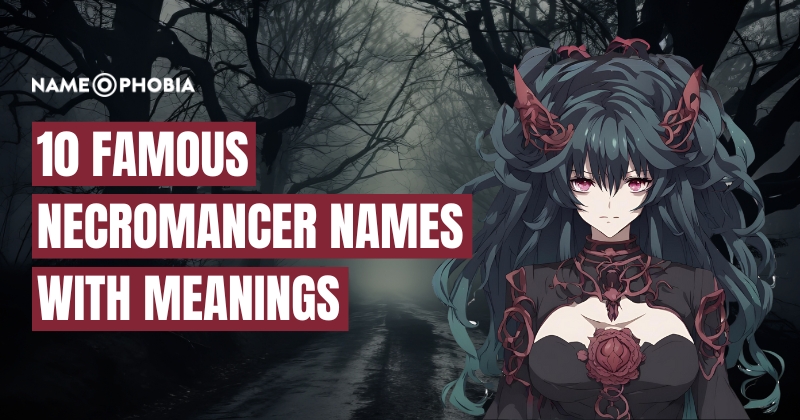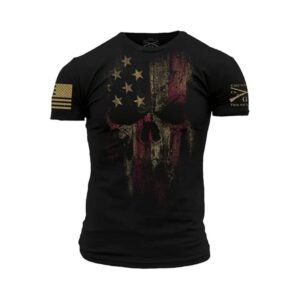Necromancer Names are all about magic and talking with the dead.
It’s like a spooky kind of magic where people try to bring back spirits or talk to them in ghostly visions.
Some peoples think it’s super dark and dangerous, like it’s from the shadowy side of magic.
Even though lots of cultures talked about necromancy in the old days, nowadays most peoples practicing magic don’t really see it as a real thing.
It’s more like something you see in scary stories or movies.
But here’s the cool part: in necromancy, names are a big deal.
They’re not just names; they carry meanings and vibes that connect to this whole world of magic and sorcery.
In this article, we’re diving into a bunch of names that could be linked to necromancers or necromancy itself.
It’s like peeling back the curtain on how words and symbols shape the magical realm.
Necromancer Names in Mythology:
- Hecate – In Greek stories, Hecate was known for witchcraft and talking to spirits from the afterlife, even bringing back the dead.
- Anubis – In Egyptian tales, Anubis was the god who helped souls move on after death, looking like a jackal.
- Odin – In Norse myths, Odin was powerful in magic and speaking with the deceased, sometimes controlling minds too.
- Baba Yaga – In Slavic stories, Baba Yaga was a witch who lived in a hut on chicken legs, able to talk to the dead and control nature.
- Baron Samedi – In Haitian beliefs, Baron Samedi is linked to death and bringing back the deceased, shown as a skeleton with a top hat and cigar.
(Click the button for 5 Necromancer Names Ideas)
Necromancer Names Generator
10 Famous Necromancer Names with Meanings:

- Merlin – “Sea fortress” (Welsh origin).
- Circe – “Falcon” or “hawk” (Greek origin).
- Simon Magus – “Magician” (Greek origin, from “magus”).
- Necronomicon – “Book of Dead Names” (fictional).
- Erichtho – Possibly related to death or darkness (uncertain).
- John Dee – “God is gracious” (Hebrew origin).
- Medea – “To plan or devise” (Greek origin).
- Abd al-Qadir al-Jilani – “Servant of the Capable” (Arabic origin).
- Simon Necronomicon – Linked to “Necronomicon” (fictional).
- Hecate – Exact meaning uncertain; associated with magic and the underworld (Greek origin).
40 Badass Necromancer Names with Meanings:
- Morgrath – Dark Lord of Shadows
- Nyxara – Mistress of Nightmares
- Ebonshade – Keeper of Eternal Night
- Draven – Soul Harbinger
- Seraphis – Whisperer of the Dead
- Valthor – Reaper of Lost Souls
- Zephyros – Wraithlord
- Lilithor – Queen of the Damned
- Mortis – Master of Death
- Aetherion – Weaver of Ghosts
- Umbros – Shadow Summoner
- Grimora – Bone Enchantress
- Zephyria – Phantom Sorceress
- Nocturnus – Lord of the Abyss
- Seraphine – Deathbringer
- Thanaros – King of the Underworld
- Valyssa – Harbinger of Doom
- Nefarius – Lord of Decay
- Tenebris – Wielder of Dark Magic
- Malvora – Queen of Shadows
- Obsidian – Keeper of the Black Flame
- Erebus – Ruler of Eternal Darkness
- Astaroth – Soulbinder
- Vespera – Mistress of the Twilight
- Necros – Lord of the Undying
- Morrighan – Shadow Queen
- Zylora – Witch of the Black Wind
- Belzara – Necromancer Supreme
- Azrael – Death’s Right Hand
- Mortem – Bringer of the End
- Valeria – Conjurer of the Dead
- Veilshadow – Lord of the Unseen
- Nyxion – Dark Enchanter
- Sablethorne – Grave Master
- Zareth – Bone Collector
- Xyphos – Phantom King
- Lyzara – Mistress of the Grave
- Hecate – Goddess of Witchcraft
- Valkaris – Death’s Envoy
- Gorgoth – Lord of the Silent Realm
40 Funny Necromancer Names with Meanings:
- Bones Malone – Jazz-loving necromancer.
- Grave Giggles – Enjoys raising dancing skeletons.
- Cadaverous Chuckles – Laughs while summoning undead.
- Skullcap Stan – Wears a skull hat, raises undead pets.
- Mortimer Mirth – Smiling necromancer who enjoys dark spells.
- Grim Grinley – Prank-loving ghost humorist.
- Necrocomedian – Performs dark comedy with zombies.
- Zomboni – Resurrects undead using a magical ride.
- Spectral Snicker – Chuckles while controlling spectral beings.
- Cacklebones – Laughs while animating bones.
- Ghoul Giggler – Finds ghouls amusing.
- Deadpan Dan – Summons the dead with a straight face.
- Skele-fun Stan – Turns skeletons into performers.
- Wraith Wit – Uses wit with wraiths.
- Bone-Jester – Jokes and performs in jester attire.
- Mirthful Mort – Cracks jokes while summoning zombies.
- Coffin Chortle – Laughs at coffins.
- Chuckling Crypt-Keeper – Makes the dead laugh.
- Tomb Tickler – Tickles skeletons back to life.
- Skelly Smirk – Mischievous skeleton-raiser.
- Ghoul Fool – Plays jokes on ghouls.
- Necro-Nanny – Babysits undead babies humorously.
- Bonesy McLaugh – Puns while animating bones.
- Rotten Riddle – Tells jokes understood by the dead.
- Jokester Geist – Pranks the living as a ghost.
- Cadaverous Comedian – Stand-up comedian for the undead.
- Cemetery Chuckler – Finds graveyard humor.
- Specter Spritzer – Refreshes undead with humor.
- Ghastly Giggles – Giggling while raising ghosts.
- Lich Laughter – Wickedly humorous lich.
- Phantom Puns – Puns from beyond the grave.
- Mausoleum Mirth – Jokes in mausoleums.
- Coffin Comedian – Comedy for the dead in coffins.
- Skelly Snicker – Snickers while reassembling skeletons.
- Graveyard Goof – Finds graveyard antics hilarious.
- Undead Uproar – Loud laughter among the undead.
- Zombiemancer Zany – Quirky zombie-raising necromancer.
- Tombstone Tickle – Tickles tombstones for laughter.
- Bonesy Banter – Witty banter with the dead.
- Macabre Mime – Silent necromancer with expressive gestures.
50 Male Necromancer Names with Meanings:

- Arcturus – Greek myth, guardian of the bear.
- Balthazar – Babylonian, “Baal’s prince.”
- Cadmus – Greek myth, possibly “to rejoice.”
- Demetrius – Greek, “follower of Demeter.”
- Eliphas – Hebrew, “God is my abundance.”
- Faustus – Latin, “fortunate.”
- Gideon – Hebrew, “mighty warrior.”
- Hadrian – Latin, “dark one.”
- Ignatius – Latin, “fiery” or “ardent.”
- Jareth – Possibly “descent” or “ruler.”
- Kael – Gaelic, “slender” or “fair.”
- Lazarus – Hebrew, “God has helped.”
- Malakai – Variant, “my messenger.”
- Necro – Prefix for “dead” or “death.”
- Orpheus – Greek myth, possibly related to “orphan.”
- Phineas – Hebrew, “oracle” or “serpent’s mouth.”
- Quinlan – Irish, “fit shape.”
- Raimund – Variant, “wise protector.”
- Severus – Latin, “stern” or “serious.”
- Thaddeus – Greek, “courageous heart.”
- Uriel – Hebrew, “God is my light.”
- Valerian – Latin, “strong” or “healthy.”
- Warrick – English, “strong place.”
- Xander – Short for Alexander, “defender.”
- Yorick – Variant, “farmer” or “earthworker.”
- Zarek – Slavic, “golden.”
- Ambrose – Greek, “immortal” or “divine.”
- Barnabas – Aramaic, “son of encouragement.”
- Caius – Roman, possibly “rejoice.”
- Darius – Persian, “possessing goodness.”
- Ezekiel – Hebrew, “God strengthens.”
- Fabian – Latin, “bean grower.”
- Gaius – Roman, possibly “rejoice.”
- Hector – Greek, “steadfast.”
- Inigo – Spanish, possibly from Ignatius.
- Jasper – Persian, “bringer of treasure.”
- Kieran – Irish, “dark-haired.”
- Lucius – Roman, “light.”
- Maximus – Latin, “greatest.”
- Nero – Latin, “strong” or “vigorous.”
- Othello – Uncertain origin and meaning.
- Paxton – English, “town of peace.”
- Quentin – Latin, “fifth.”
- Roderick – Germanic, “famous ruler.”
- Silas – Latinized, “wood.”
- Tiberius – Roman, possibly from Tiber River.
- Ulysses – Latinized, from Odysseus.
- Virgil – Roman, possibly “flourishing.”
- Wolfgang – German, “traveling wolf.”
- Xavier – Basque, “new house” or “bright.”
-
Sale!

Barra .177 Air Gun Caliber Pellet Sniper Rifle with Scope
Original price was: $ 139.97.$ 125.99Current price is: $ 125.99. Check on Amazon -

Men’s Golden Dragon T-Shirt, Short Sleeve Anime Graphic
$ 19.99 Check on Amazon -
Sale!

Schleich Eldrador – Lava Dragon Action Figure for Children’s
Original price was: $ 24.99.$ 19.86Current price is: $ 19.86. Check on Amazon
50 Female Necromancer Names with Meanings:

- Abaddon – Destruction, ruin.
- Belladonna – Beautiful lady; also a toxic plant.
- Cassandra – Prophetess in Greek myth.
- Danika – Morning star, judgment of God.
- Eris – Greek goddess of discord.
- Fae – Fairy, magical being.
- Gorgon – Terrifying creature in myth.
- Hecate – Greek goddess of magic.
- Isadora – Gift of Isis, fertility.
- Jinx – Brings bad luck.
- Kali – Hindu goddess of destruction.
- Lilith – Night demoness.
- Morgana – Enchantress in legends.
- Nadia – Hope, generosity.
- Ophelia – Tragic literary character.
- Pandora – All-gifted in Greek myth.
- Queenie – Royal, queen-like.
- Rhiannon – Welsh mythological queen.
- Sable – Black, dark.
- Tamsin – Derived from Thomas, twin.
- Ursula – Little bear, also a saint.
- Valeska – Powerful, independent.
- Winifred – Blessed peace, fair one.
- Ximena – Listener, hearkening.
- Yara – Water lady, Brazilian myth.
- Zara – Blossom, princess.
- Acantha – Thorny, sharp.
- Brynhildr – Norse mythological figure.
- Circe – Greek sorceress.
- Drusilla – Fruitful, dewy-eyed.
- Euryale – Greek myth, wide.
- Freya – Norse goddess of love.
- Giselle – Pledge, hostage.
- Hella – Norse goddess of the underworld.
- Iliana – Bright, shining.
- Jezebel – Wicked biblical queen.
- Kaida – Little dragon, Japanese.
- Lamia – Greek myth, monster.
- Maleficent – Harmful, wicked.
- Nyx – Greek goddess of night.
- Onyx – Black gemstone.
- Persephone – Greek queen of the underworld.
- Queen of Hearts – Ruler of love in Alice in Wonderland.
- Ravana – Antagonist in Hindu myth.
- Samael – Angel of death.
- Titania – Fairy queen in A Midsummer Night’s Dream.
- Undine – Water spirit.
- Vespera – Evening star.
- Wicked Witch – Evil sorceress.
- Xenia – Greek name, hospitality.
Conclusion
Necromancer Names are fascinating because they delve into magic and sorcery, focusing on communicating with the dead. Whether summoning spirits or attempting to bring them back to life, these names touch on a darker side of the mystical arts.
What makes Necromancer Names intriguing is their deep meaning and history. Whether rooted in ancient myths, inspired by legendary necromancers, or creatively unique, there’s a wide range to explore.
Crafting a guide for these names with good research, clear descriptions, and a strong understanding of your character can really enhance your story or game, adding depth and authenticity to a world where the supernatural meets the everyday.
(FAQs) Frequently Asked Questions About Necromancer Names:
What makes a good necromancer name?
A good necromancer name should sound dark and mysterious, making the character seem powerful or a bit scary. Think of names inspired by myths or ancient languages.
Can necromancer names be used for any gender?
Yes! Necromancer names like “Nyx” or “Obsidian” can work for any gender.
Should the name match the necromancer’s personality?
Definitely. Necromancer names that hint at a character’s traits or powers, like “Soulbinder” for someone who controls spirits, add extra depth.
Are there cultural influences to think about?
Yes, many necromancer names come from ancient myths or cultures. Just be respectful and avoid cultural appropriation.
How do I create a unique necromancer name?
Mix parts of different words, use mythological names, or tweak existing names to make them sound more magical.
Can necromancer names be funny?
They can be, but make sure the name fits the overall tone of your story or game.
How important is the meaning of necromancer names?
The meaning behind necromancer names can add depth to your character, hinting at their role or powers.



